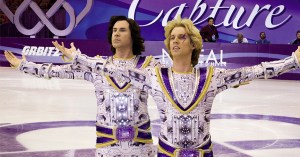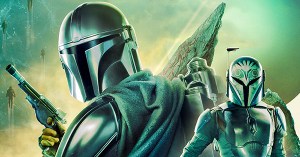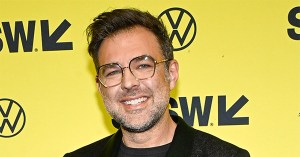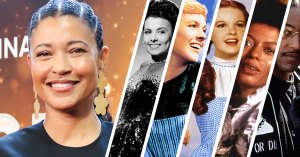Hugh Jackman’s 10 Best Movies
We count down the best-reviewed work of the Logan star.
After nearly 20 years and a slew of X-Men franchise installments, Hugh Jackman walked away from Wolverine (presumably) with this past weekend’s Logan. In celebration of his impressive run as one of comics’ most popular characters, we decided to devote this week’s list to a fond look back at some of the brightest critical highlights from a wonderfully eclectic filmography that looks like it’s only begun to tap into his prodigious potential. Snikt! It’s time for Total Recall!
10.

Looking at its premise on paper — giant robots boxing! — you might expect Real Steel would be the sort of critic-proof flick that takes a tumble on the Tomatometer while luring action enthusiasts to the cineplex in blockbuster-sized droves. The reality, however, was surprisingly complex; it’s actually a family drama with sci-fi overtones, starring Hugh Jackman as a washed-up boxer who becomes a promoter after robot boxers take over, and Dakota Goyo as the estranged son who helps him build a pugilistic machine that’ll rule the ring. Laced with enough grit to keep from becoming a total CGI fest while still making room for a handful of adrenaline-inducing set pieces, Steel earned a somewhat muted response from audiences, who turned out in respectable but not spectacular numbers — and a surprising amount of admiration from critics like NPR’s Linda Holmes, who argued, “Real Steel is ridiculous, but it is not dispiriting. If you’re going to make this movie, it should be made just this way, with commitment, verve and a complete disregard for physics, robotics and environmentalism.”
9.

Round up a bunch of dramatic actors, hand them a classic musical, and ask them to sing — live in front of the camera, no less — and if nothing else, you’re bound to get points for audacity. Les Miserables director Tom Hooper courted disaster with this approach to his 2012 adaptation of the Broadway favorite, but emerged largely unscathed, winning a pile of Golden Globes and picking up eight Oscar nominations (including Best Picture) while racking up more than $440 million in worldwide grosses. Not bad for yet another version of a story just about everyone had already seen, and although a number of critics were unmoved by the movie’s unabashed efforts to wring tears from the audience, the majority found all that huge drama impossible to resist. An acknowledged singing talent in a cast notably short on them, Jackman earned an Academy Award nomination for his work as the long-suffering Jean Valjean — but Glenn Kenny of MSN Movies thought he “should get a Nobel Prize for the way he carries pretty much the whole undertaking on his shoulders, so protean and virile is his singing and acting throughout.”
8.

The homicidal streak that makes Wolverine such a fascinating character in the comics is also what’s made him relatively problematic on the big screen, and its PG-13 neutering is part of what rendered Hugh Jackman’s previous solo outing as the clawed superhero, X-Men Origins: Wolverine, such a disappointment for longtime fans. Director James Mangold had the benefit of lowered expectations when it came time to helm the follow-up, The Wolverine, but the end result — which drew inspiration from a beloved ‘80s comics story that sent the character to Japan — earned more than a slow clap from critics; as Mick LaSalle enthused for the San Francisco Chronicle, “Somewhere along the line somebody must have had a crazy idea, that The Wolverine required a decent script, and shouldn’t rely only on action, audience goodwill and the sight of Hugh Jackman with his shirt off. The team delivers with this one.”
7.

After Batman Begins hit big, Christopher Nolan and Christian Bale had their pick of projects to choose from — and they opted to reunite for The Prestige, a film Nolan had been eyeing since his post-Memento days. In this adaptation of the Christopher Priest novel, Bale stars opposite Jackman in the tale of two early 20th century magicians driven to dangerous lengths in their personal and professional feud. With a plot hinging on a series of progressively more unpredictable twists and turns, The Prestige was bound to provoke a number of divergent responses, but with gross receipts over $100 million and a Certified Fresh 76 percent Tomatometer, it packed enough of a suspenseful flourish to earn praise from scribes such as Peter Travers of Rolling Stone, who observed, “there are nifty tricks galore up the sumptuous sleeve of this offbeat and wildly entertaining thriller.”
6.

An inspirational sports dramedy about a Winter Olympics hopeful with slim chances of success and a coach who also happens to be a disgraced former competitor, Eddie the Eagle has some obvious similarities to Cool Runnings — and in fact its protagonist, real-life British ski jumper Eddie “the Eagle” Edwards, competed at the same Olympics that hosted Runnings‘ Jamaican bobsled team. But no sports movie is purely original anyway, and beyond those undeniable similarities to stories we’ve heard before, this good-natured dramatization of Edwards’ story — starring Taron Egerton in the title role and Jackman as his hard-drinking coach Bronson Peary — has no shortage of individual charm. “A tad sugary sweet,” admitted the Toronto Sun’s Liz Braun, “but thanks to the performances of Hugh Jackman and Taron Egerton, the end result is a family film that’s highly entertaining.”
5.

Today, Hugh Jackman is pretty much synonymous with the role of Wolverine, but he wasn’t Bryan Singer’s first — or second — choice for the part; in fact, it only fell to him after Russell Crowe’s salary demands and Dougray Scott’s scheduling conflicts kept both of them from bringing the clawed, cigar-chomping antihero to the screen. Jackman, an unknown at the time, represented a bit of a gamble for the long-in-development X-Men adaptation, but with an ensemble cast that included Patrick Stewart as Professor X, Sir Ian McKellen as Magneto, and Halle Berry as Storm, the summer of 2000 brought Marvel’s favorite mutants to the big screen in style, racking up almost $300 million in worldwide grosses and a healthy stack of positive reviews from critics like New York Magazine’s Peter Rainer, who deemed it “A rarity: a comic-book movie with a satisfying cinematic design and protagonists you want to watch.”
4.

How far would you go to find — or find justice for — your child? That dark dilemma sits at the heart of Denis Villeneuve’s Prisoners, a taut 2013 drama starring Jackman as Keller Dover, a father frantic with worry after his daughter disappears. When the police release their first suspect, Dover abducts the man (Paul Dano) and holds him captive, intent on gathering information by any means necessary — even though his prisoner has the mental capacity of a 10-year-old and might not even be responsible for the crime. Surrounded by a stellar cast that included Jake Gyllenhaal and Viola Davis, Jackman anchored this unflinching descent into every parent’s nightmare with the palpable anguish needed to make the story tick. “The plot raises complicated moral questions about how far an anguished person will go for the love of a child,” wrote Claudia Puig for USA Today. “At the same time, it sets up an intricate, horrifying mystery with breathtaking skill.”
3.

Given the long odds it faced just getting to the screen, let alone pulling off the transition so successfully, it seemed altogether unlikely that X-Men’s inevitable sequel would be able to achieve the same standard, let alone exceed it – but that’s exactly what 2003’s X2: X-Men United did, both at the box office, where it grossed over $400 million, and among critics, who praised it even more highly than its predecessor. This was, appropriately, accomplished two ways: One, the screenplay satisfied critics and longtime fans by tackling the comic’s long-running sociological themes, most explicitly the fear of “outside” elements (in this case, sexy super-powered mutants) and how that fear is channeled by xenophobic authority figures; two, the sequel ramped up the original’s gee-whiz factor by introducing characters like the teleporting, prehensile-tailed Nightcrawler – and daring to tease at the Marvel title’s Phoenix storyline, one of the most beloved, brain-bending plots in the publisher’s history. The result was a film that remains both a fan favorite and a critical benchmark for writers like Variety’s Todd McCarthy, who lauded X2 as “bigger and more ambitious in every respect, from its action and visceral qualities to its themes.”
2.

Unlike the majority of film franchises that reboot themselves with younger casts, the X-Men series has the built-in advantage of drawing from comics mythology that makes room for time travel as well as superhumanly slow-aging mutants — which is how Jackman found himself called upon to once again do battle as Wolverine in X-Men: Days of Future Past. The plot, which involves Wolverine going back in time to prevent Mystique (Jennifer Lawrence) from carrying out a political assassination that spells certain doom for mutantkind, includes all manner of tangled threads that could have sent the movie tumbling into the weeds, but director Bryan Singer tied it all nimbly together in his triumphant return to helming the franchise, uniting the OG X-Men with their younger counterparts in a blockbuster extravaganza that even managed to retcon the much-maligned X-Men: The Last Stand out of the official timeline. “Everything is of a piece,” wrote the Wall Street Journal’s Joe Morgenstern, “and it’s dazzling.”
1.

Third time’s the charm. After whiffing on their first opportunity to give Wolverine a compelling solo outing with the calamitous Origins, then inching a little closer to snikt-worthy cinema with The Wolverine, Fox finally gave fans a properly grim and gritty third installment. Logan peers into a dark future for our favorite mutants, with most of the X-Men dead after a mysterious tragedy and Wolverine reduced to working as a driver while caring for an ailing Professor X (Patrick Stewart) and saving up enough money to buy a boat and sail off into aquatic exile. Fate has less peaceful plans for our heroes, of course; in short order, Logan finds himself embroiled in a dangerous plot involving a mysterious lab and a young girl on the run (Dafne Keen). It’s a classic Wolverine caper, loosely inspired by the Old Man Logan comics arc, and delivered with all the hard-hitting, hard-R panache fans waited patiently to see — not to mention the vast majority of critics. “Entertaining as they are, Marvel movies aren’t expected to be this mature, this dark or this human,” wrote Colin Covert for the Minneapolis Star Tribune. “This is a bold, coherent story inspired by a comic book, not slavishly based on it.”








